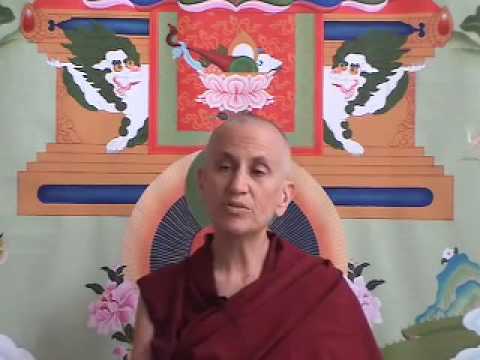The time of death is indefinite
Stages of the Path #25: Death & Impermanence
Part of a series of Bodhisattva’s Breakfast Corner talks on the Stages of the Path (or lamrim) as described in the Guru Puja text by Panchen Lama I Lobsang Chokyi Gyaltsen.
- Examining our tendency to think that death will always come “later”
- How much energy it takes to keep the body alive
- Being ready for death by practicing the Dharma
In discussing the lamrim we’ve been talking about the section on impermanence and death, and how remembering death gives meaning to our lives because it reminds us that we’re not always going to be here. It acts as a mirror to ask ourselves, “What am I doing that’s important?” and it also puts us in the mental space of thinking what happens at the time of death, and how do we want to die, and what happens after death and where do we want to be reborn after death. That meditation on impermanence and death is very helpful for really making us think deeply about our lives.
Yesterday we talked about how death is definite. Today we’ll talk about how the time of death is indefinite.
We may know that we’re going to die, but we always think “later, later, later. It doesn’t happen to me, or if it happens to me, not now, not today. Or if it happens to the people I love, not now, later, later, later.” It’s so strange because our ignorance about this is so strong that when somebody dies we’re always very shocked. Even if somebody’s been very ill and in the hospital for a long time, when they die we’re always still surprised somehow. And yet if we really reflect on the fact that as human beings we’re caused phenomena, then anything that has a cause is going to change, and when the causal energy stops then the result stops, and so this life is going to stop, and our consciousness will go on into the next body.
The three points under “the time of death is indefinite” is that people are always in the middle of doing something when they die. We have this thing of, “okay, maybe I’m going to die someday, but first I want to do this, and I want to do this, and there are all these fun things to do, and all these thing to experience, traveling to do, and things to learn, and people, and this and that, and I’ll do all of those, and then sometime when it’s convenient, then I’ll die.” But it doesn’t happen like that, does it? Death just comes whenever. It’s just there. People are always in the middle of doing something. Some are in the middle of eating. Some are in the middle of walking. Some are in the middle of just breathing, and it stops.
The second point under that is that it takes a lot of energy to keep our body alive, but very little for it to die. Look at what we have to do all day long to keep this organism alive. It’s a lot of work, isn’t it? You have to get food. You have to clean it. You have to keep it healthy. You have to do this and that. It takes a lot of energy to keep the body alive. Whereas if we did nothing, if we just sat there, eventually the life would stop.
The third point under that is that even very small things can cause the end of our life. Just a small virus, a small bacterium, a small piece of something in the wrong part of our body, and there goes our life.
It’s very good to make examples of people you know and the different ways in which they’ve died. What’s caused their deaths? Were they prepared at the time of death? It’s very good to think about these things and then say, “Well if death came to me today, am I ready? Am I just going to go on big freak-out saying I don’t want to die?” But saying “I don’t want to die” who are you going to complain to? What are you going to do? There’s no way to stop it when it’s happening.
The idea is to be ready for death, and we become ready for death by practicing the Dharma, by releasing our ignorance, anger, and clinging attachment, because it’s those things that are going to make the dying process difficult. When people don’t have ignorance, anger, and attachment, dying, they say, is like going on a picnic. There’s no problem, they have a good time. Understanding that the time of death is indefinite really makes us wake up and think about what’s important in our lives and to prepare for our death.
Venerable Thubten Chodron
Venerable Chodron emphasizes the practical application of Buddha’s teachings in our daily lives and is especially skilled at explaining them in ways easily understood and practiced by Westerners. She is well known for her warm, humorous, and lucid teachings. She was ordained as a Buddhist nun in 1977 by Kyabje Ling Rinpoche in Dharamsala, India, and in 1986 she received bhikshuni (full) ordination in Taiwan. Read her full bio.


